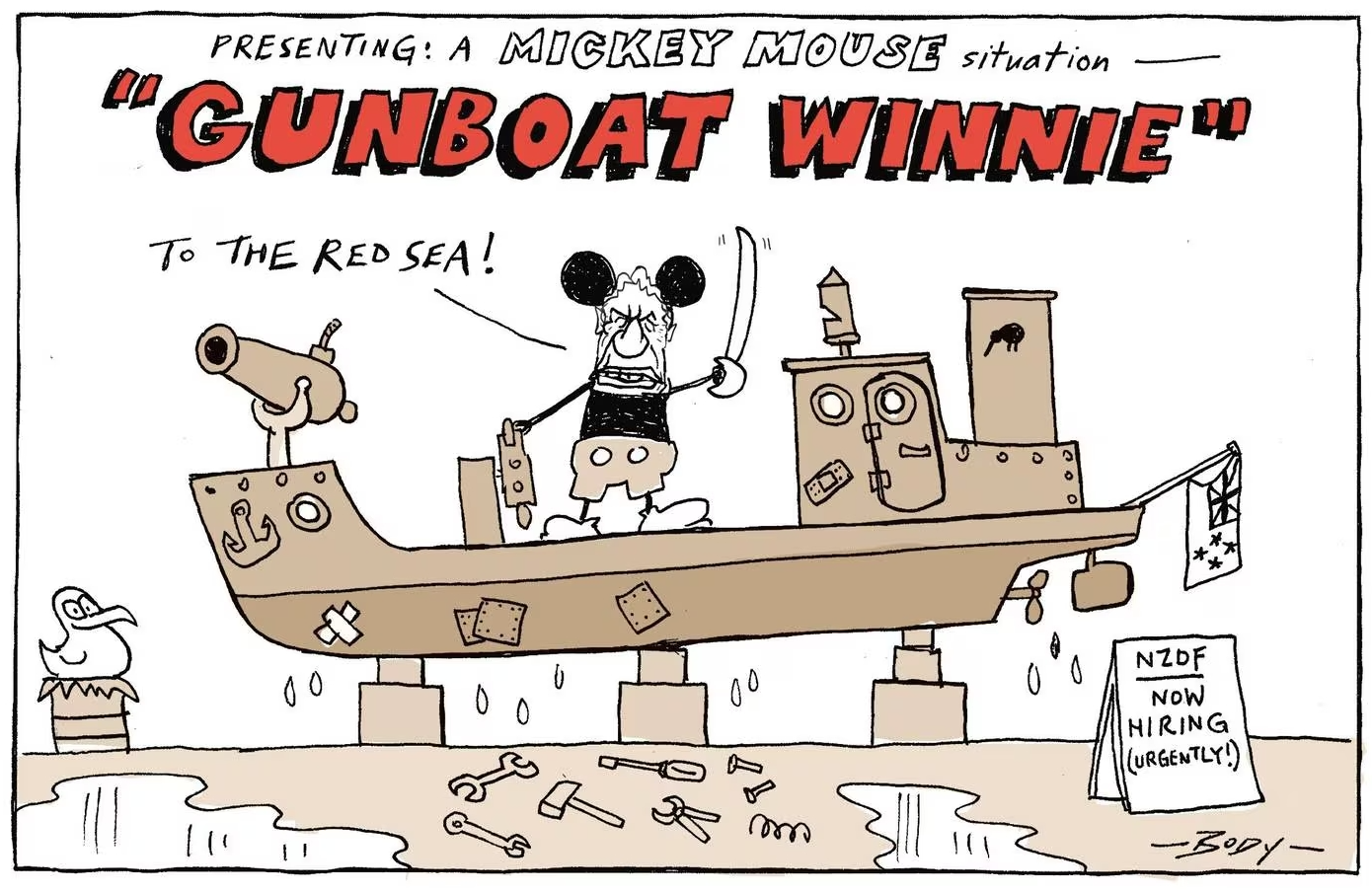
And Surprise, Surprise: He’s Pushing for New Zealand to Join AUKUS, an Anti-China Military Security Partnership of the U.S., Australia and Great Britain
New Zealand held its triennial general election in October 2023 and the result was what had been predicted by the polls all along—the Labour Party, which had been in power since 2017, was defeated, making it the first two-term Government since the 1980s (also a Labour government). Labour’s defeat was entirely predictable, ever since the January 2023 shock announcement by Prime Minister Jacinda Ardern that she was resigning as Prime Minister, and from politics, with just a few weeks’ notice.
Chris Hipkins, her successor as PM (chosen by his Labour caucus colleagues), was doomed. No unelected Prime Minister in Governments of either major party (Labour or National) has ever gone on to win an election (by unelected, I mean those chosen by their caucus colleagues as opposed to a popular election). Hipkins joins that list—he was in office for all of eight months.
Labour’s defeat (by the conservative National Party) was all the more remarkable for one unique reason. Since 1996 New Zealand has had a proportional representation electoral system. It arose from a binding referendum and was aimed at curbing the unbridled power of Governments.
But in the 2020 election, the Ardern Government won an absolute majority, something that is not supposed to happen under proportional representation and was very rare under the old system. Meaning that, for the 2020-23 term, Labour could govern alone, without any need for coalition partners. So the resounding election defeat in 2023 (Labour only got 26% of the vote) was quite a reversal.
A key reason for Labour’s resounding victory in 2020 was that it was the “Covid election.” New Zealand is globally recognized for having had one of the best responses to the pandemic crisis—a 2023 study calculated that 20,000 lives were saved. That might not sound like many to an American audience but New Zealand’s population is only five million.
During the 2020 lockdown period New Zealand had only 26 deaths—since Covid restrictions were lifted, the number of deaths has grown into the low thousands. In early 2020, polls showed National on track to win that year’s election. Then Covid happened and several hundred thousand National voters switched to voting Labour out of gratitude for saving their lives and the economy. In 2023 they went back to National.
New Zealand’s new Prime Minister is Christopher Luxon, with an extensive background in big business, most recently as CEO of Air New Zealand. Throughout 2023 the polls predicted a Government of National in coalition with the smaller, further right-wing ACT Party. But that did not happen. (The ACT Party has been around since the 1990s. Its current incarnation offers a main course of Reaganomics, with a side serving of racism.)
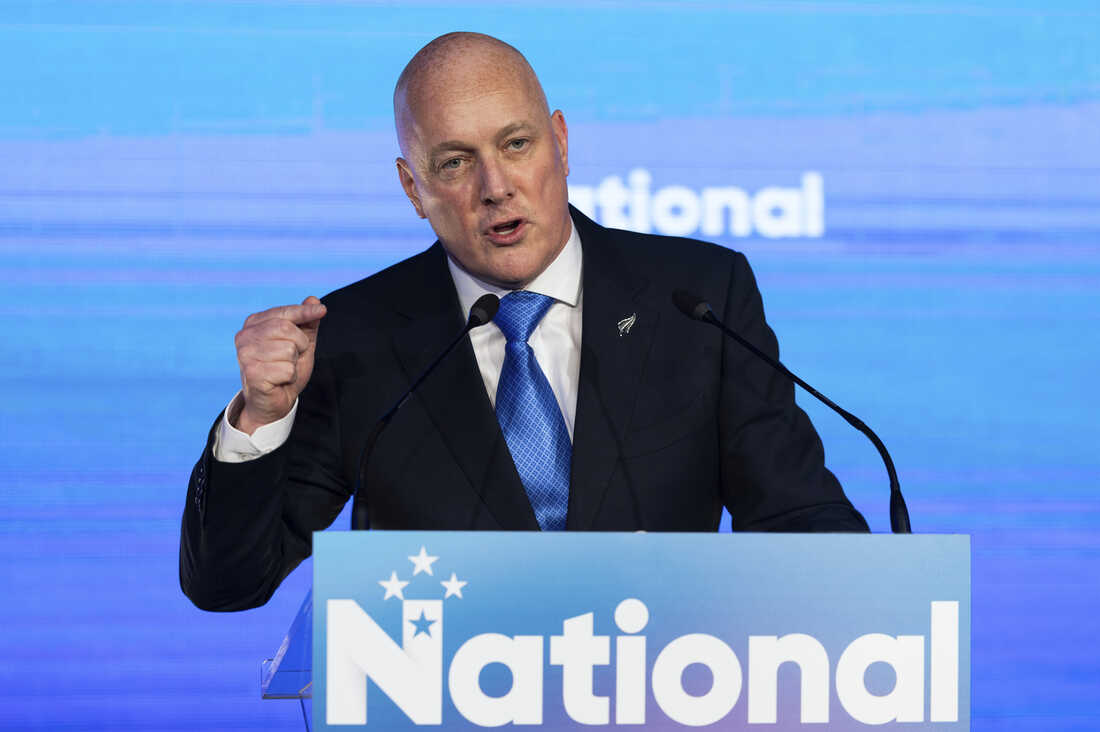
In order to be able to form a Government, Luxon had to do a deal with not only ACT but also New Zealand First, a smaller right-wing party, also dating from the 1990s. New Zealand now has its first ever three-party coalition Government. Winston Peters, New Zealand First’s Leader, is Minister of Foreign Affairs, and he will also be Deputy Prime Minister for the first 18 months of the Government’s term, when that post will be rotated to ACT’s Leader, David Seymour.
Winston Peters: Leading Figure in Governments Headed by Rival Parties
This is another remarkable chapter in the saga of Winston Peters, the great survivor and ultimate chameleon of New Zealand politics. Why? Because during Labour’s first term (2017-2020), New Zealand First was in coalition with it. Peters was Jacinda Ardern’s Minister of Foreign Affairs and Deputy Prime Minister; indeed, he was Acting Prime Minister for six weeks while she was on leave having a baby. He and New Zealand First were voted out of Parliament in the 2020 election. In the 2023 election, they were back, and went with National this time.
What is more remarkable is that this flipflopping is not the first time it has happened. Peters and New Zealand First originally came into power at the 1996 election, the first under the proportional representation system. In his finely honed role as kingmaker—one which he reprised in 2023—Peters chose to go with National. He was rewarded with being appointed Deputy PM, plus the newly created role of Treasurer (which has not existed since). That coalition did not last the three-year term, falling apart in 1998. Peters and his party remained in Parliament.
By the time of the 2005 election, Labour was back in power and Peters got into bed with them. This time he was Minister of Foreign Affairs. He lasted a term but at the 2008 election, Labour was voted out of office and Peters and New Zealand First were voted out of Parliament. Both got back into Parliament at the 2011 election (when National was in power). At the 2017 election, kingmaker Peters chose Labour, despite National having won the most votes on election night.
And he was once again Deputy PM and Minister of Foreign Affairs, until he and his party were voted out in 2020. Now he is back—in both roles—and his party is in coalition with National. To put this into American terms: He would have been simultaneously Vice President and Secretary of State in both Democratic and Republican administrations. Not once, but twice with each. Both he and his party have been voted out of Parliament twice, and voted back in twice.
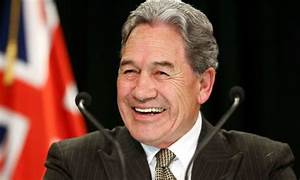
Mercurial Populist
Peters is a right-wing populist and old school conservative (he proudly described New Zealand First’s role in the 2017-20 coalition Government with Labour as a “hand brake”). Throughout the decades, his politics have been all over the place. When New Zealand First started, it cut its teeth as an anti-immigration party. It has also, at times, been on the same page as the Left—for example, I shared a speaking platform with Winston Peters at a 1990s public meeting organized by us in the Campaign Against Foreign Control of Aotearoa. Both New Zealand First and CAFCA were campaigning against a bill liberalizing the foreign investment regime under a National Party government.
The reason he gave for going with Labour in 2017 was totally unexpected. During his live TV speech in which he announced his choice of Labour as New Zealand First’s Coalition partner, he said: “Far too many New Zealanders have come to view today’s capitalism, not as their friend, but as their foe. And they are not all wrong. That is why we believe that capitalism must regain its responsible—its—human face. That perception has influenced our negotiations.”
Winston Peters is no opponent of capitalism. He just wanted capitalism to be “humanized.” But it is extraordinary that it was he who raised this subject—certainly the mainstream media thought so. What an indictment of the now former Labour government that its only public critic of capitalism was an old Tory warhorse from way back.
Perhaps Winston had acquired some of the wisdom that is supposed to come with age. Or maybe it was just guilt. The ruling class can rest easy. If Winston Peters ever mentioned capitalism again during his three years as Deputy Prime Minister (2017-20), I am not aware of it. He certainly did not do anything about it. And I certainly do not expect that to change now that he is back in bed with National, once again as Deputy PM.
True to his mercurial form, in early 2022—while out of Parliament—Peters was the only politician to meet the thousands of anti-vaccine activists, with a strong presence of the extreme Right, who laid siege to Wellington’s Parliament Building for several weeks. All other politicians, Left and Right, had agreed to refuse to engage with them. The siege ended with a riot when the police moved in to clear it. And now he is second-in-command of what has been described as New Zealand’s most right-wing Government since the 1990s.
Half a Century of Service to U.S. Empire
There has been one consistent theme throughout Winston Peters’ half-century as a politician (he first entered Parliament, under the old electoral system, as a National Party MP in the late 1970s)—unwavering service to the U.S./New Zealand alliance. I have previously written in CovertAction Magazine about Peters’ role in the CIA’s failed attempt to get rid of New Zealand’s 1980s Labour Government which brought in the country’s signature nuclear-free law (it remains in effect today).
Peters has devoted his decades in Parliament, both in and out of Government, to championing the U.S. alliance. Upon being appointed Minister of Foreign Affairs in 2017 by Ardern, he said that he had devoted his previous stint at Foreign Affairs (2005-08, under Labour) to rebuilding New Zealand’s relationship with the U.S. Television news illustrated this with a clip of him shaking hands with then-Secretary of State Condoleezza Rice.
Here is a quote from a 2005 U.S. Embassy cable (one of those leaked by WikiLeaks): “We believe that Peters is genuinely interested in improving bilateral relations with the United States, and during his introductory meeting with Ambassador McCormick last week he made clear this was a priority. (FYI: Peters purposely made sure that Ambassador McCormick was the first Ambassador he met with as Foreign Minister).”
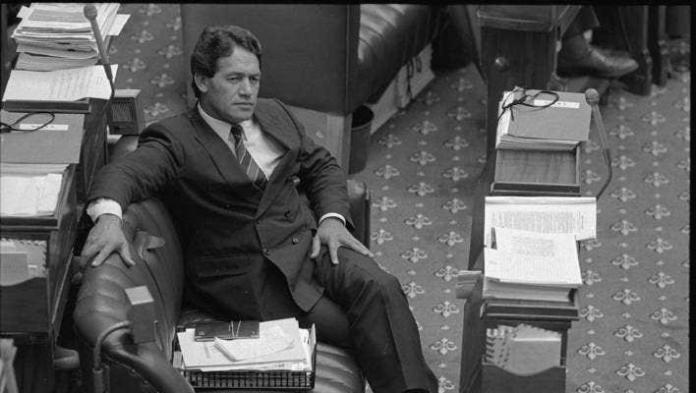
Signing Up New Zealand to U.S.-Led Red Sea Coalition
Despite having been Minister of Foreign Affairs for only a few months, Peters has gone straight back to work for the U.S. Empire. As Audrey Young wrote in the New Zealand Herald: “Peters has wasted no time in refreshing New Zealand’s foreign policy direction, away from so-called independent foreign policy and firmly into the orbit of the United States, Australia and the UK.”
Young continued: “In a speech to foreign diplomats in Wellington last night, he minimized the notion that New Zealand had an independent foreign policy by acknowledging that every country had one. On security, he pledged to ‘reinvigorate’ New Zealand’s engagement with the United States, Five Eyes ‘and other key security partners in the region and beyond.’”
By early January 2024 [when politicians and the country at large were away on summer holidays] Peters took it several steps further, to the great approval of rightwing journalists.
“On January 4, Peters tweeted ‘New Zealand stands with its partners in condemning the Houthis’ ongoing illegal, unacceptable and destabilizing attacks on commercial shipping in the Red Sea.’”
“In effect, New Zealand has joined with 11 other allies of the United States to deliver a final warning to the Houthi Yemeni rebel group to cease its attacks on international shipping in the Red Sea or bear the consequences.”
“Peters followed through subsequently in a call with U.S. Secretary of State Antony Blinken, announcing on X (formerly Twitter) that they had discussed the importance of the U.S.-New Zealand strategic partnership, strengthening cooperation to address regional and global challenges, the situation in Ukraine, and the Israel-Gaza conflict.”
“Peters emphasized that, since the 1990s, New Zealand had contributed to maritime security in the Middle East, noting that there are currently up to 12 New Zealand Defense Force personnel deployed to the Combined Maritime Forces in Bahrain. But it would appear that any New Zealand participation, as with Australia, would be limited to the inclusion of a very few military personnel in the existing Red Sea task force, Operation Prosperity Guardian.”
Edging Closer to Joining AUKUS
“New Zealand and the U.S. today are drawing closer. In Sydney in December, Christopher Luxon signaled the Government was exploring Pillar Two of AUKUS—a security partnership for the Indo-Pacific region between Australia, the UK and the U.S.”
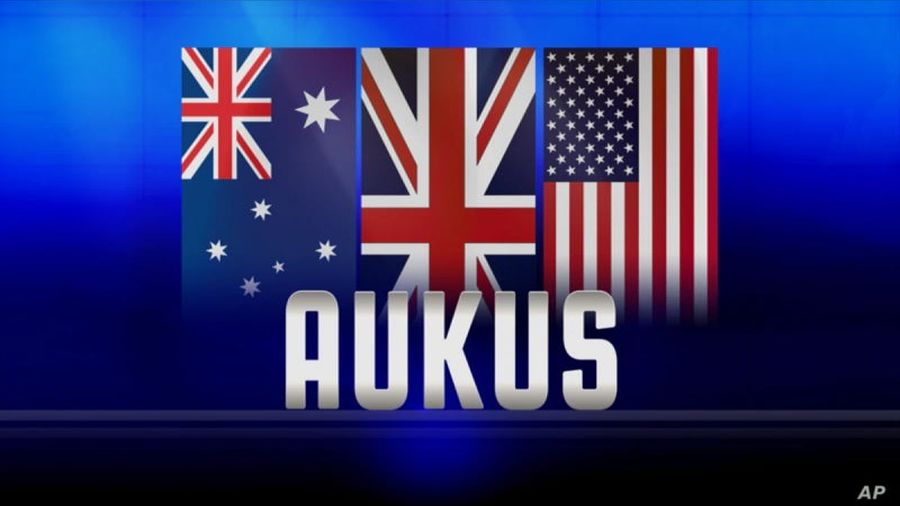
Joining the Red Sea gunboat diplomacy armada is all about New Zealand’s fixation on keeping the global sea lanes open for trade. And currying favor with the U.S. on trade politics is consistent with New Zealand’s long-standing ambition to secure a free trade agreement with the U.S., which remains a shimmering mirage. New Zealand’s new government has not issued one syllable of condemnation about Israel’s genocide in Gaza, but waxes indignant at a threat to shipping in the Red Sea. Its priorities are nakedly obvious.
It is worth noting that neither defense policy, nor foreign policy, nor intelligence alliances, were ever mentioned in the 2023 election campaign, which was fought on strictly domestic economic issues. National, which is now the Government, did not even release a defense policy for the campaign. But now we have Peters swearing allegiance to the Stars and Stripes, and PM Luxon hinting at New Zealand getting involved with AUKUS further down the track.
Opposition to AUKUS Continues to Grow, Right Across Spectrum
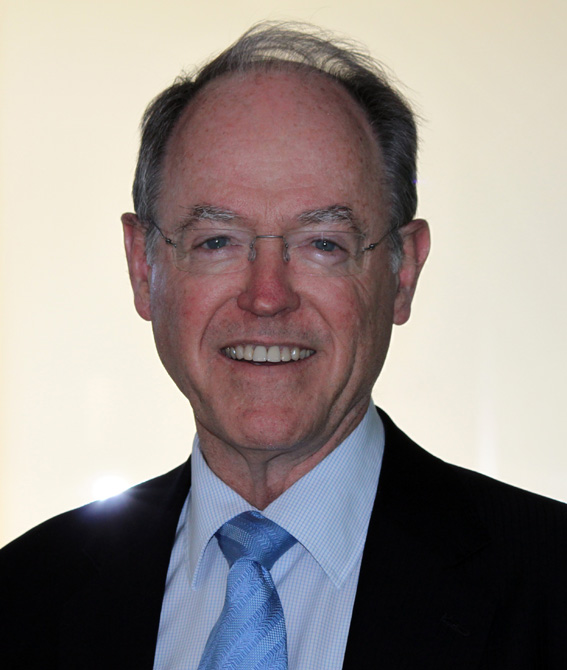
Not only from the usual suspects, but also from the most unlikely of people. Don Brash was the Leader of the National Party when it was in Opposition, from 2003 to 2006, and then he was the Leader of ACT in 2011. So, he was the leader of two of the three parties that comprise New Zealand’s current government. In December 2023 he wrote an opinion piece in the New Zealand Herald titled “Why on Earth Would We Join AUKUS in Any Form?”
This is the same Don Brash who, as Leader of the National Party, had said that, if he won the 2005 election, the nuclear-free policy would be “gone by lunchtime.” This shows the range of people opposed to any expansion of New Zealand’s involvement with the U.S. Empire and indicates that Winston Peters, Christopher Luxon, et al., will have a fight on their hands. The New Zealand people have a long and noble history of opposition to U.S. imperialism.

CovertAction Magazine is made possible by subscriptions, orders and donations from readers like you.
Blow the Whistle on U.S. Imperialism
Click the whistle and donate
When you donate to CovertAction Magazine, you are supporting investigative journalism. Your contributions go directly to supporting the development, production, editing, and dissemination of the Magazine.
CovertAction Magazine does not receive corporate or government sponsorship. Yet, we hold a steadfast commitment to providing compensation for writers, editorial and technical support. Your support helps facilitate this compensation as well as increase the caliber of this work.
Please make a donation by clicking on the donate logo above and enter the amount and your credit or debit card information.
CovertAction Institute, Inc. (CAI) is a 501(c)(3) non-profit organization and your gift is tax-deductible for federal income purposes. CAI’s tax-exempt ID number is 87-2461683.
We sincerely thank you for your support.
Disclaimer: The contents of this article are the sole responsibility of the author(s). CovertAction Institute, Inc. (CAI), including its Board of Directors (BD), Editorial Board (EB), Advisory Board (AB), staff, volunteers and its projects (including CovertAction Magazine) are not responsible for any inaccurate or incorrect statement in this article. This article also does not necessarily represent the views the BD, the EB, the AB, staff, volunteers, or any members of its projects.
Differing viewpoints: CAM publishes articles with differing viewpoints in an effort to nurture vibrant debate and thoughtful critical analysis. Feel free to comment on the articles in the comment section and/or send your letters to the Editors, which we will publish in the Letters column.
Copyrighted Material: This web site may contain copyrighted material the use of which has not always been specifically authorized by the copyright owner. As a not-for-profit charitable organization incorporated in the State of New York, we are making such material available in an effort to advance the understanding of humanity’s problems and hopefully to help find solutions for those problems. We believe this constitutes a ‘fair use’ of any such copyrighted material as provided for in section 107 of the US Copyright Law. You can read more about ‘fair use’ and US Copyright Law at the Legal Information Institute of Cornell Law School.
Republishing: CovertAction Magazine (CAM) grants permission to cross-post CAM articles on not-for-profit community internet sites as long as the source is acknowledged together with a hyperlink to the original CovertAction Magazine article. Also, kindly let us know at info@CovertActionMagazine.com. For publication of CAM articles in print or other forms including commercial internet sites, contact: info@CovertActionMagazine.com.
By using this site, you agree to these terms above.
About the Author

Murray Horton is organizer of the Campaign Against Foreign Control of Aotearoa (CAFCA) and an advocate of a range of progressive causes for the past five decades.
He can be reached at: cafca@chch.planet.org.nz.



I don’t think Peters can be characterized as a globalist. He is an economic nationalist (as alluded to by Murray Horton) and a colonialist (a staunch defender of the British connection) and while these positions may seem contradictory, it is a contradiction that he shared with the late National Party leader Sir Robert Muldoon. His pro-American tendencies arguably arise out of his pro-British sentiments (his mother was Scots) and are premised on the “special relationship” that Britain has with the United States. His name (Winston) might not seem to be material but it is, because in Maori families (he had a Maori father) the given name is often an indication to the world of the role envisaged for the child in question. Peters was raised to be a colonialist Winston Churchill and like Churchill, he has a half-concealed contempt for Asiatics and Arabs coupled with an excessive regard Americans of British ethnicity. However it would be wrong to blame the course of the present government on Winston Peters. The problem is that New Zealand as a whole is held in a vice-like grip by the colonialist regime. Any elected member of the House of Representatives must swear an oath of allegiance to King Charles or forfeit their seat. The Labour Party (still fondly regarded by some as a working class party) is even more strongly attached to the colonialist regime than the “national capitalist” National Party. It’s first parliamentary leader, M J Savage, famously declared “Where (Britain) goes we go. Where she stands we stand”. The New Zealand public, however, have been pretty much at odd with the colonialist politicians for the past half century, and the “Five Eyes” affiliations of the ruling political cliques are decidedly unpopular.
Winston is the eternal opportunist. He didn’t care a fig about the people protesting at parliament but he saw the situation as a way to gain political advantage. Nor does he care about the truth around Covid and the vax, as evidenced by his choice of chair of the Royal whitewash. Winston saw America as a ticket to ride; for many years he made regular visits to…John McCain. He’s a globalist through and through and it looks increasingly like we’re collectively in for a rough ride. As for joining AUKUS, it’s a fear-based strategy and in considered opinion a foolish one, as we have no need to choose “sides”, and neutrality is a viable and sensible option.